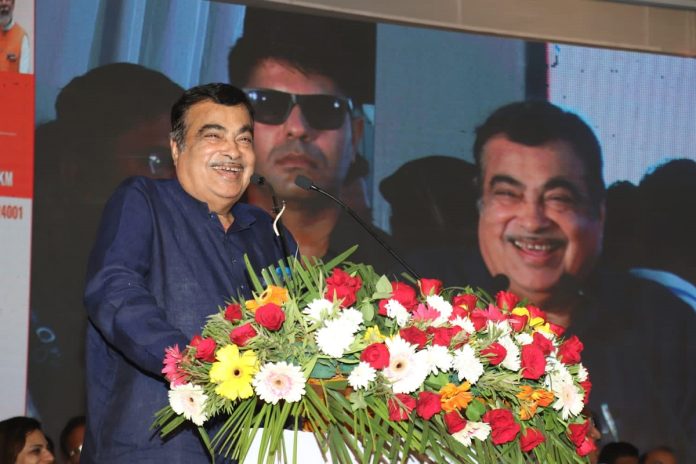Snapshot
Green hydrogen can be produced in our country from molasses, sugarcane, broken rice, bamboo, foodgrains, and agro-wastes.
Research has shown that ethanol’s mileage is same as that of petrol, whereas the price is much lesser.
In a move towards use of green hydrogen at a large scale, Union Minister for Road Transport and Highways Nitin Gadkari has asked IITians to prioritize needs-based research.
Gadkari has asked the IITians to focus their research on use of bio-technology for production of bio-CNG, bio-LNG and green hydrogen from biomass.
The Union Minister was speaking at Alankar-2022, a global leadership summit organized by Shailesh J Mehta School of Management in IIT Bombay on Saturday.
We require prioritizing needs-based research, he further said to the IIT Bombay students. He said research should come up with import substitute, cost-effective, pollution free, indigenous solutions.
“We need to identify the commodities being imported in the country and then focus on developing Swadeshi alternatives for those. This will lead to decrease in imports, increase in exports and make our economy stronger”.
Proven technology, economic viability, availability of raw materials and marketability should be considered for all research projects, he said.
Stating that green hydrogen will be used in various industries like chemicals, fertilizers, steel etc., and also in transportation sector in the future, Gadkari urged the young, talented engineering man-power of the country to do research on manufacturing green hydrogen from electrolysis sewage water and bio-digestion of organic wastes.
This will also help municipalities of the country in implementing Swachh Bharat Mission along with value-addition in the form of waste to wealth, he added.
In this context, the Minister narrated how the Nagpur Municipal Corporation has practically demonstrated this philosophy of waste to wealth by undertaking treatment of sewage water and then selling it to the state power producer Mahgencos for their power projects at Koradi and Khaparkheda Thermal Power Stations which is generating an annual revenue of Rs 325 crore for them.
Green hydrogen can be produced in our country from molasses, B-Heavy molasses, sugarcane, broken rice, bamboo, foodgrains, agro-wastes.
In Assam, a project of producing ethanol from bamboo has started, IOCL project in Panipat forms 150 tonne bio-bitumen per day from rice straw (or parali as in called in Hindi), an agro-waste product which is the major cause of air-pollution in Delhi and neighbouring areas in the winters.
This project is also generating 1 lakh litre bio-ethanol. Besides, 5 tonnes of parali also gives 1 tonne bio-CNG at the IOCL plant, informed the Minister.
In this context, he said, water, power, transport, communication are prerequisites for industry, which in turn will bring about capital investments and employment.
Speaking about alternative fuel based transport, Gadkari stated that companies are making motor-cycles and scooters run on bioethanol fuel.
Now research has shown that ethanol’s mileage is same as that of petrol, whereas the price of ethanol which is around Rs 60 is much lesser, he added.
Meanwhile, Road Transport and Highways secretary Alka Upadhyaya on Saturday (29 October) held a high-level meeting in hybrid mode to review the progress of “Special Campaign 2.0”, which started on 2 October and will continue till 31 October.
Upadhyaya spoke to concerned officials and directed them to take steps to dispose all pending MP references, PMO references, public grievances, parliament assurances, state government references etc., and ensure cleanliness of the office premises, toll plazas etc., in line with the spirit of the campaign, by target date 31 October 2022.
As part of the “Special Campaign 2.0”, the Road Transport and Highways Ministry has been carrying out various activities across the country — from disposing of pending files to maintaining cleanliness at field offices of the Ministry and its various other subsidiaries like National Highway Authority of India (NHAI) and National Highways and Infrastructure Development Corporation Limited (NHIDCL).
The Ministry is also taking special measures to ensure that the National Highway stretches are pothole-free, for the convenience of the highway users.
Under the campaign, till 29 October, 553 out of 694 MP references, 993 out of 1,049 public grievances, 12 out of 16 PMO references, 26 out of 28 state government references have been disposed-off while 7,060 physical files, which were identified for weeding, have been weeded out so far.
Cleanliness campaigns have been carried out at 2,466 locations, which include toll plazas, Regional Offices of MoRTH/NHAI/NHIDCL.
The Ministry has earned Rs 7.07 lakh by disposing scrap during the campaign. As much as 1,936 sq ft space has been freed after the scraps were disposed of.


